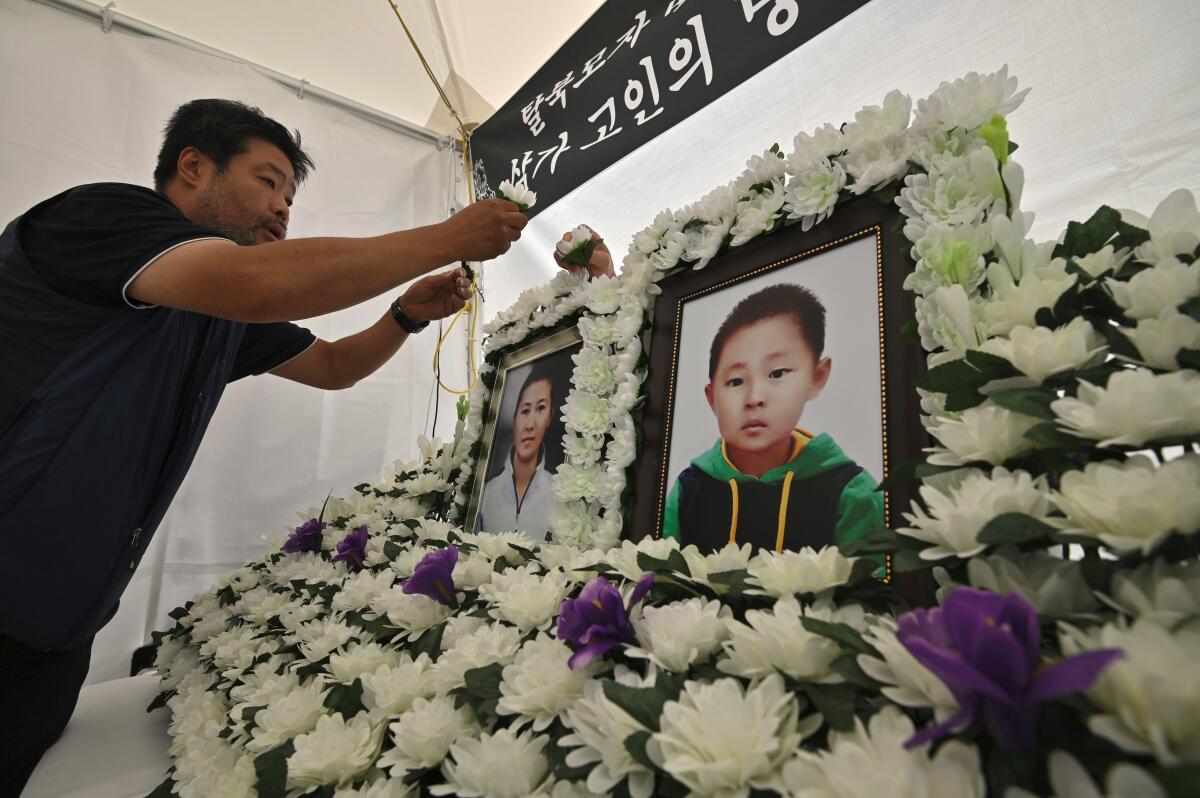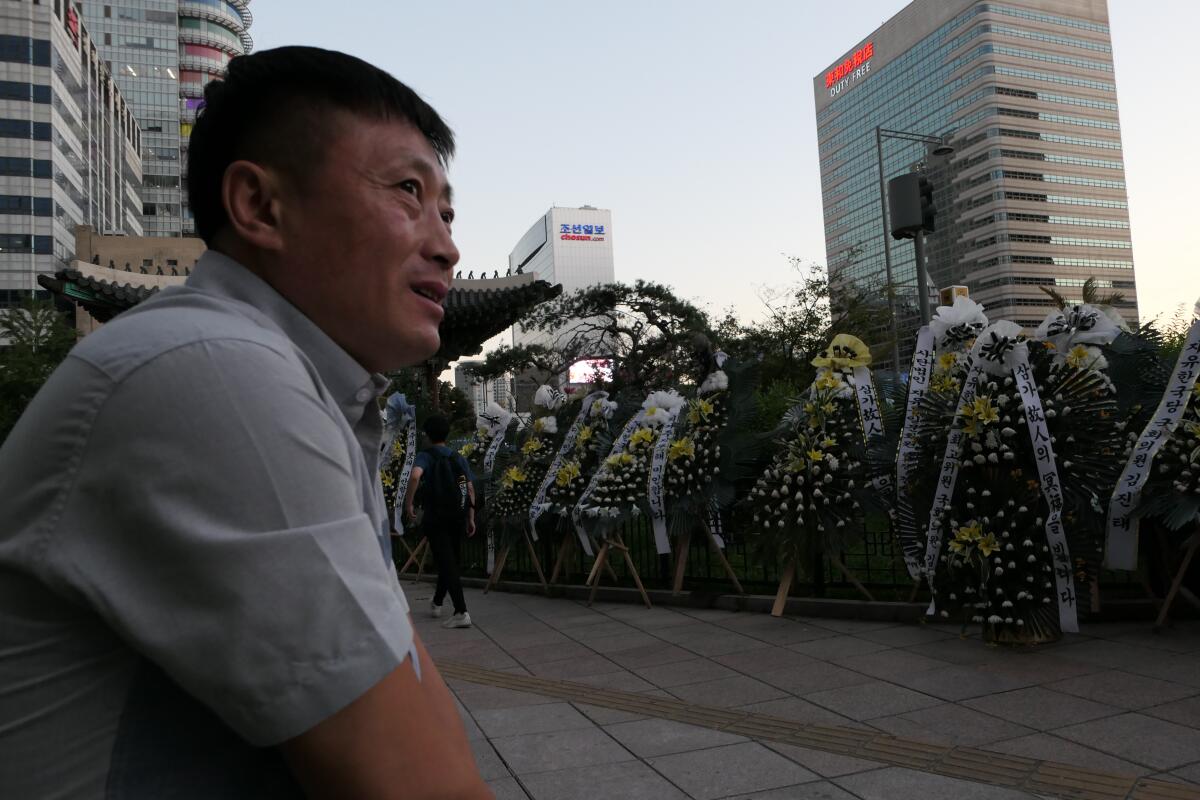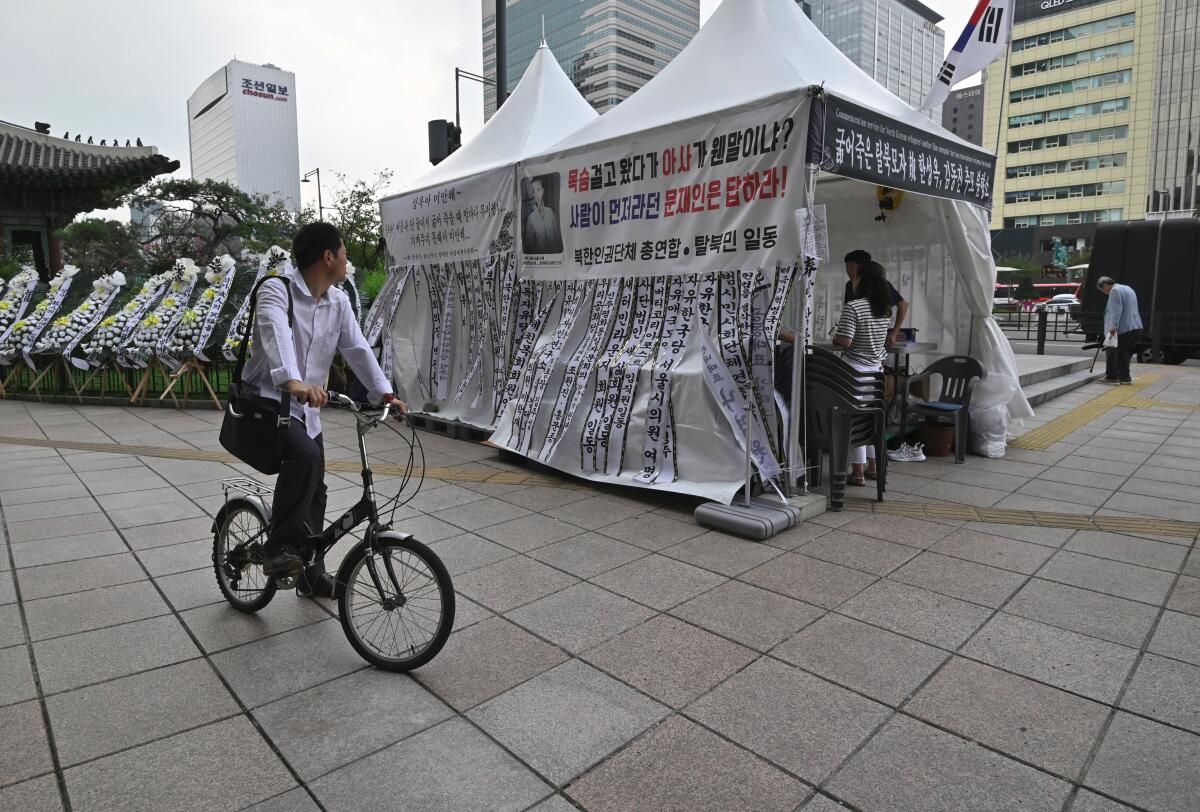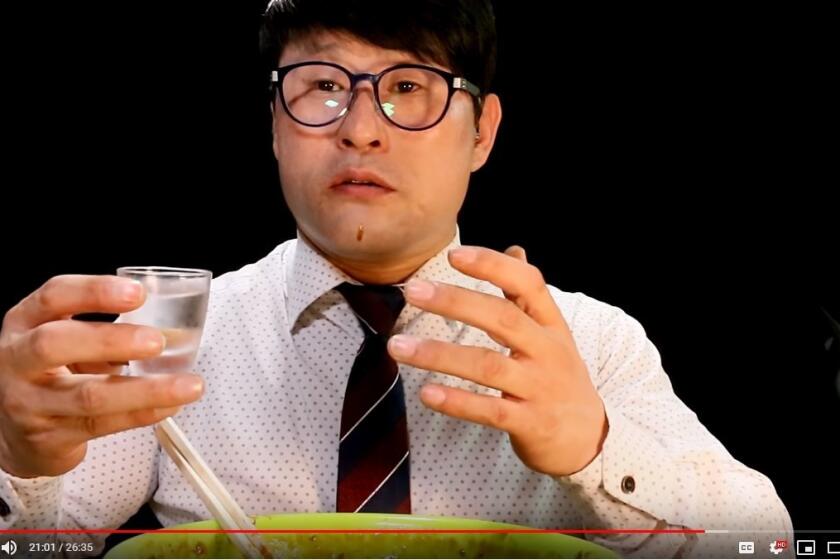She fled North Korea for a better life. How her lonely, impoverished death became political

- Share via
SEOUL — When they heard the news about Han Sung-ok, they gathered from all corners of the capital and other South Korean cities near and far.
Most had never met the 42-year-old single mother, who long ago had escaped from North Korea.
She and her 6-year-old son Dong-jin had little contact with the outside world in the months leading up to late July, when they were found dead in a low-income Seoul apartment, possibly of starvation.
But many fellow North Korean refugees felt like they knew her. They understood the dangers Han must have endured to reach this metropolis — and the hardships that came with trying to make a new life.
And so they converged amid the high-rises in downtown Seoul at a makeshift memorial, forming a stand-in family to keep vigil. That was weeks ago.
Politicians and cameras have come and gone, chrysanthemums have wilted and yellowed. Night after night, unknowing tourists have snapped photos, and joggers have passed without a second look.
The mourners are still there.
::
It was a water meter inspector who noticed the foul odor coming from the apartment and alerted the building management.
Column One
Column One is a showcase for compelling storytelling from Los Angeles Times.
A television crew broke the news two weeks later, and upon entering the vacated unit, flipped through her bank statement and discovered that in mid-May she’d withdrawn her last 3,858 won — about $3.
The cleaner who emptied the sparsely furnished apartment told the television crew that the only thing he found in the refrigerator was red pepper powder, leading to speculation that the mother and son had starved to death.
Police would neither confirm nor deny that, saying only that there was no sign of foul play or disease and that the autopsy could not determine a cause of death because of the condition of the bodies.
The news rapidly spread through the scattered community of the roughly 33,000 North Korean escapees living in South Korea.
The memorial was born when some of them set up a folding table on the sidewalk and placed a framed photo of Han on it. The mourners lit sticks of incense and perched them atop a cardboard box.
Following traditional Korean funeral rites, they began keeping overnight vigil there.
Choi Myung-chul read about it on social media and drove more than an hour from his home in the coastal city of Incheon.
“It was like she was a relative,” said Choi, 39. “It feels like this didn’t happen to a stranger.”

Back in North Korea, the only exposure he had to Seoul was through movies that circulated illegally. He marveled at the tall buildings, traffic-clogged avenues and limitless supply of electricity.
He made a run for it six years ago, slipping across the Yalu River into China. Twice, he was caught and sent back.
He succeeded on his third try, and after a few months in China, found a smuggler to take him to the border with Laos. From there, he walked through the mountains for eight days, making his way to Thailand, where he sought refuge at the South Korean Embassy.
Later he heard that his brother, who had also tried to escape, was caught and eventually died in a North Korean prison.
Choi received a resettlement payment when he arrived in South Korea, but he had to use it all to pay the smuggler. He begged for meals from other refugees while he waited for his next check from the government.
Later he married another North Korean refugee and had a daughter. They live in subsidized housing and scrape by on his meager wages from delivering Chinese food.
Choi has watched the memorial grow into a more elaborate shrine to Han, with more flowers, a white tent and an expanded altar that also includes a photograph of her son.
The memorial has also become a potent symbol of protest by a group that has been rarely heard and largely apolitical. The refugees believe the government has failed to protect them, a responsibility that falls to the Unification Ministry.
Choi and a half-dozen or so other North Koreans keep vigil day after day, greeting the mourners who come to lay a chrysanthemum, sign a guest book and bow at the altar.
Han’s life was all of their lives, Choi said.
“She risked her life to get here.”
::
Kim Yong-hwa never forgot the first time he saw Han’s hands.
Han was barely 30, but they were wrinkled and calloused, as though they belonged to someone a decade or two older. At the time, she was living in the Chinese countryside.
That’s where she met Kim, who had escaped North Korea in the 1980s and was living in Seoul, where he was starting a charity to help other refugees get to South Korea and begin new lives.
It was unclear how long Han had been out of North Korea. But she told Kim that after she got to China she was sold as a bride to a Chinese man and had a son with him.
Kim, who had heard many similar stories, brought Han to South Korea about 10 years ago, leaving her husband and son behind. A few years later, Han gave birth to Dong-jin.
Han got a job at a shipyard, but when that work dried up she went back to China. Kim last heard from her this past winter when she said she had just divorced her Chinese husband and returned to Seoul.
She asked for help finding work. Kim told her about a possible job scrubbing pans at a restaurant, but she said she couldn’t manage it while also caring for her son.
Han also hoped to secure government assistance and asked Kim to talk to a local welfare agency on her behalf. When Kim called, he was told Han needed to submit her divorce papers before she could qualify for benefits as a single parent.
Kim tried to explain to the official that was nearly impossible for her, with an uncooperative ex-husband in China, but it was to no avail.
Now he wonders if it would have made a difference if he’d gone to visit Han, if he would at least have managed to get her some donated supplies.
His phone rings day after day with calls from other refugees asking for help finding jobs, used refrigerators or even some plates.
For weeks, Kim held out on visiting the memorial. He finally went by recently but couldn’t bring himself to enter.
“How could I face her now, when I couldn’t do anything for her while she was alive?”
::
One of the mourners was a 41-year-old woman who had taken a train the length of the country to get to the memorial.
She understood starvation. Years ago, as a doctor in North Korea, she saw many of her fellow citizens waste away on hospital beds during widespread famine.
“Most people who starve to death die with their eyes open,” she said. “It’s almost like they hold on to hope until the end.”
Her parents were still in North Korea, and because she was worried about their safety, she asked to be identified only as Park, her last name.
She arrived in Seoul around the same time as Han and lived in the same dormitory with her and about a dozen other refugees for a few months. They were all students in a government-run resettlement education program.
Among the lessons they were taught: Be wary of spies among your fellow North Koreans.
Park said that message made it difficult for them to open up to one another and is the reason so few people knew much about Han, whom she remembers as a sweet-tempered loner.
The two would sporadically run into one another at holiday events for North Korean refugees. Still, Park knows firsthand the difficulties Han must have faced.
Upon finishing her resettlement training, Park was given a government subsidy that barely covered her housing deposit and phone contract. She went through her first several winters without ever turning on the heat.
Once when her donated rice cooker broke, she barely ate for 15 days.
She found part-time jobs at convenience stores and restaurants but struggled to communicate with South Koreans because of all the English words they used. Her accent drew funny looks.
Eventually, Park put herself through medical school in South Korea and now runs her own business, a postpartum care center.
People such as Park are an exception, said Lee Na-kyung, a fellow escapee who runs a charity to support other refugees who are disabled or raising children on their own.
Lee said she started the group after hearing the stories of two single mothers who struggled so hard to earn a living that they left their young children at group homes, where they suffered from anxiety and refused to eat and speak.
About 70% of the North Korean refugees are women, and after Han’s death, dozens of new ones contacted Lee’s organization seeking help.
::

It was after 11 on a recent Saturday night in downtown Seoul. The cacophony of the city had died down and the insurance building next to the memorial had gone dark.
Kim J.B. helped her 5-year-old daughter set up an orange tent on the sidewalk so the girl could get some sleep while her mother kept watch over the memorial. Taped above the tent door was a handwritten sign: “Do not enter — except for Mom.”
She too had no relatives or friends to help her with babysitting.
She asked that her full name not be published for the safety of relatives back in North Korea. Dressed in all black, she wore the traditional hemp armband signifying a family in mourning.
In 10 days at the memorial, she said, she’d shed more tears than when her own parents died. As a 47-year-old single mother who divorced an abusive husband and lives on government support, she could relate to how dire things must have gotten for Han in her final days.
“We all lived through the ‘Arduous March’ and survived,” she said, referring to a period of severe famine in North Korea in the 1990s. “How can you starve here? Dogs and pigs get fed well here.”
The mourners want the South Korean government to provide a proper burial and funeral rites for Han, a clearer accounting of why she and her son died, and an investigation holding officials responsible.
But their demands run deeper than Han’s case. They say newly arriving refugees should receive better job training and more financial and other support.
The Unification Ministry has acknowledged there have been “blind spots” and said it was examining its policies and procedures. The ministry announced last week it would conduct a wholesale survey of vulnerable North Korean refugee households across the country.
City officials also came by the memorial saying they intended to clear it because the structure wasn’t properly permitted.
The city backed off after one of the refugees doused himself with gasoline and threatened to set himself on fire.
More to Read
Sign up for Essential California
The most important California stories and recommendations in your inbox every morning.
You may occasionally receive promotional content from the Los Angeles Times.










